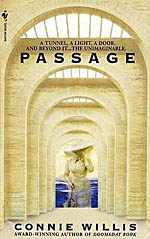
![]() justifiedsinner
justifiedsinner
9/8/2012
![]()
I'm not a fan of Connie Willis's books. This is the fourth I've read so far after Doomsday Book, To Say Nothing of the Dog and Blackout.
I have found them only marginally Science Fiction. The time machine is introduced without much in the way of background. The rules of its use seem set up to introduce dramatic elements in the story without any regard for scientific consistency. The post-plague England the stories are framed in is a curiously retro affair for which no reason is given. Technology, except for time travel, seems stalled again for no apparent reason except perhaps reduced population density. And what an England and what an Oxford she chooses to inhabit – not the lively Oxford of Amis and Larkin and the momentous discovery, in 1963, of sexual intercourse. No, we have instead a rather twee Oxford more akin the escapist world of the Inklings than anything else. All of which seems rather an excuse to write an historical novel from the point of a contemporaneous observer an exercise that gives no real feeling for the period and comes off rather badly when compared to the works of such historical novelists as Hilary Mantel or Penelope Fitzgerald.
So it was a pleasant surprise to read a novel of Willis' that didn't feature these rather shoddy contrivances.
Passage has a contemporary setting. The novel concerns an investigation into Near Death Experiences or NDEs. Joanna Lander is a clinical psychologist who is interviewing patients at a large hospital who have experienced an NDE. She is often frustrated in her research by a charlatan researcher called Maurice Mandrake. She meets another researcher called Richard Wright who has found a way of chemically inducing NDEs, he asks her to interview his experimental subjects. After many of Wright's volunteers fail to pan out she undergoes the procedure herself. A large part of her motivation for doing so is to try and save the life of Maisie a young girl in the hospital who suffers increasingly frequent ventricular fibrillations.
She finds herself in a dark passage and after various re-iterations of the procedure determines that she is in a dream-like version of HMS Titanic. Much of the story consists of Lander trying to find out whether the Titanic is a product of her imagination and only derived from facts she knew or whether it is a real after death experience. Gradually she comes to the realization that NDE's are an attempt by the brain to send a message to the living. A message that never gets through. Just before Lander can impart this information to Wright but after she has blurted it out to Mandrake she is stabbed to death in the ER by a drug crazed patient. Before she dies she utters some enigmatic words to a nurse.
Lander finds herself back on the Titanic, which is starting to sink. Wright manages to work out Landers message, develops a drug and saves Maisie. The book ends with Lander afloat on a piano, accompanied by a young girl and a dog and watching a battleship steam closer.
The novel still has many of Willis' irksome traits. One of her habits as a novelist is to show how her characters are frustrated by events by describing in lengthy detail and item by item the very events causing their frustration. One finds oneself sympathizing with the character. One also finds oneself wanting to throw the book out of the window. Another of her habits is give the names of people, restaurants, shops and the like which have no baring on the plot and which never recur in the novel.
Overall this is the best novel I have read by Ms Willis but I can only give it a rating of 3/5.